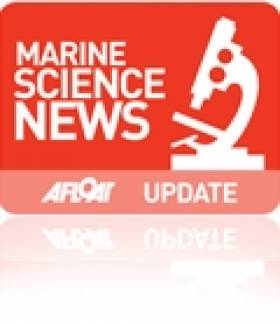Displaying items by tag: Moytirra Vent Field
Scientists Discover World of Wonder Beneath the Atlantic
The Irish-led scientific expedition aboard the RV Celtic Explorer has discovered a previously uncharted field of hydrothermal vents along the Mid-Atlantic Ridge.
As previously reported on Afloat.ie, the team includes geochemists, marine biologists, marine geologists, marine geneticists and technicians from Ireland and the UK as well as a three-person TV crew from National Geographic filming for a documentary series to be broadcast next year.
The mission, led by Dr Andy Wheeler of University College Cork, returned to Cork last Thursday from an investigation 3,000 metres below the sea surface using their Remotely Operated Vehicle (ROV) Holland 1 at the first hydrothermal vent field to be explored north of the Azores.
Hydrothermal vents, which spew mineral-rich seawater heated to boiling point by volcanic rock in the Earth’s crust below, are home to a rich variety of marine life that thrives in complete darkness on bacteria fed by chemicals.
“On the first dive, we found the edge of the vent field within two hours of arriving on the seafloor, ” said Dr Wheeler. “Often the search for vents takes much longer, and our success is a testament to the hard work and skill of everyone on board.”
The field has been named the Moytirra Vent Field, after a battlefield from Irish mythology that means ‘Plain of the Pillars’.
“In comparison with other vent fields, Moytirra contains some monstrous chimneys and is in an unusual setting at the bottom of a cliff - a real beauty,” said Patrick Collins rom NUI Galway’s Ryan Institute.
His colleague John Copley of the University of Southhampton added: “Using the ROV’s high-definition video camera, we’ve watched unusual orange-bodied shrimp crawling around the chimneys, among clusters of tiny green limpets.
“Elsewhere there are writhing scale-worms, swirling mats of bacteria and eel-like fish – a riot of life in this unlikely haven on the ocean floor.”
Speaking from the RV Celtic Explorer in Cork, Marine Minister Simon Coveney hailed the “exciting new discovery”.
“Ireland is positioning itself as a centre for marine research from a European and international perspective and this work should be supported and welcomed,” he said.




























































